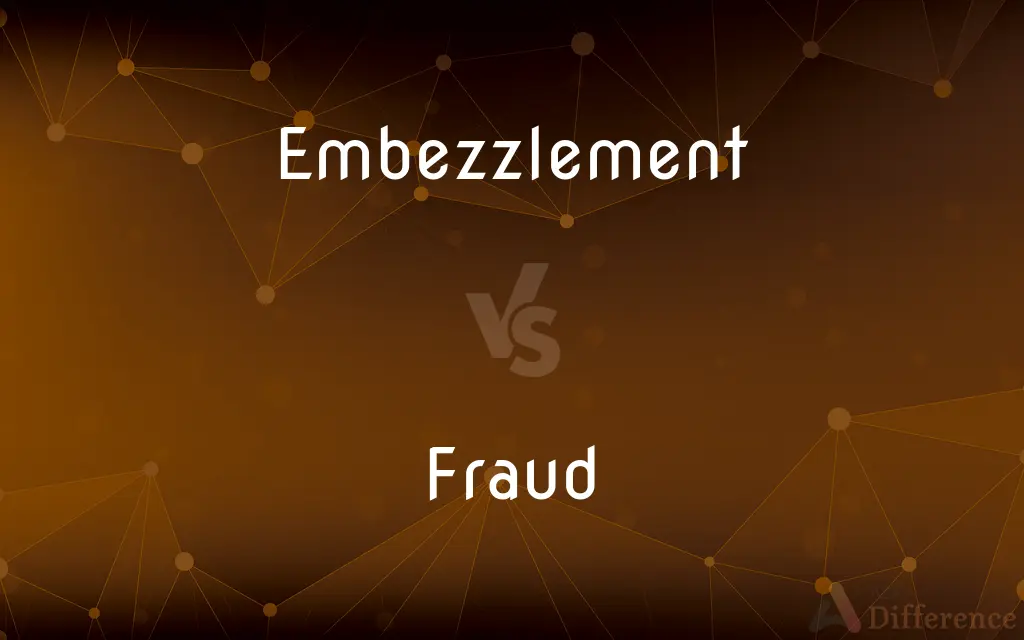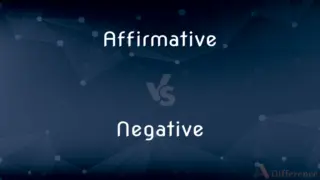Embezzlement vs. Fraud — What's the Difference?
By Fiza Rafique & Maham Liaqat — Updated on March 15, 2024
Embezzlement is a form of financial fraud involving the unauthorized taking of assets by a person who is entrusted with those assets, while fraud broadly encompasses any deceitful practice or false representation intended to gain an unfair advantage.

Difference Between Embezzlement and Fraud
Table of Contents
ADVERTISEMENT
Key Differences
Embezzlement is a specific type of fraud that occurs when an individual, who is in a position of trust or responsibility over certain assets, misappropriates those assets for personal use. It's characterized by the betrayal of trust and often involves employees or fiduciaries. Whereas, fraud is a wider category that includes any wrongful or criminal deception intended to result in financial or personal gain. Fraud can take many forms, including but not limited to identity theft, investment scams, and false advertising.
In embezzlement, the perpetrator has legal access to the assets but uses them in an unauthorized way, making it a subtle form of theft that's often challenging to detect. On the other hand, fraud can involve outright theft, misrepresentation, or other deceitful tactics that don't necessarily rely on a pre-existing trust relationship.
Embezzlement often requires a pre-existing relationship between the embezzler and the victim, where the embezzler has been entrusted with property or funds. Fraud, however, can be committed by strangers, acquaintances, or even by entities such as corporations, without any foundation of trust.
Legal repercussions for embezzlement can include restitution, fines, and imprisonment, focusing on the breach of trust aspect. Fraud charges also carry severe penalties, but the focus is on the deceitful act and its impact on victims, which can range from financial loss to personal damage.
In practical terms, preventing embezzlement often involves internal controls and audits within organizations, whereas combating fraud might require broader measures, including public education, legal enforcement, and regulatory oversight to address its many forms.
ADVERTISEMENT
Comparison Chart
Definition
Unauthorized taking of assets by someone entrusted with them
Deceitful practice to gain an unfair advantage
Key Element
Breach of trust
Deception
Perpetrator-Victim Relationship
Often exists prior to the act
May or may not exist
Methods
Misappropriation of funds or property
Various deceptive tactics
Legal Repercussions
Restitution, fines, imprisonment
Fines, imprisonment, restitution
Compare with Definitions
Embezzlement
Misappropriation of funds placed in one's trust or belonging to one's employer.
The accountant was found guilty of embezzling thousands of dollars from the company.
Fraud
Wrongful or criminal deception intended to result in financial or personal gain.
She was a victim of online fraud that drained her savings.
Embezzlement
Unauthorized use of assets for personal gain by someone trusted with their control.
The manager embezzled company resources to fund his personal projects.
Fraud
Misrepresentation of significant facts to deceive or trick.
The company committed fraud by falsifying its financial statements.
Embezzlement
Financial theft carried out by individuals in a position of trust.
As the treasurer, she embezzled club funds over several years.
Fraud
A person or thing intended to deceive others, typically by unjustifiably claiming or being credited with accomplishments or qualities.
The so-called 'miracle cure' was exposed as a fraud.
Embezzlement
Covert misappropriation of assets differing from outright theft due to the abuser's legal access.
He was charged with embezzlement after diverting client investments to his account.
Fraud
A deliberate act of deception to secure unfair or unlawful gain.
He sold fake insurance policies, committing insurance fraud.
Embezzlement
A form of white-collar crime involving the breach of fiduciary responsibilities.
The financial advisor's embezzlement scheme was uncovered during an audit.
Fraud
The use of deceitful means to deprive another of their rights or property.
Identity theft is a common type of fraud targeting personal information.
Embezzlement
Embezzlement is the act of withholding assets for the purpose of conversion of such assets, by one or more persons to whom the assets were entrusted, either to be held or to be used for specific purposes. Embezzlement is a type of financial fraud.
Fraud
In law, fraud is intentional deception to secure unfair or unlawful gain, or to deprive a victim of a legal right. Fraud can violate civil law (e.g., a fraud victim may sue the fraud perpetrator to avoid the fraud or recover monetary compensation) or criminal law (e.g., a fraud perpetrator may be prosecuted and imprisoned by governmental authorities), or it may cause no loss of money, property, or legal right but still be an element of another civil or criminal wrong.
Embezzlement
Theft or misappropriation of funds placed in one's trust or belonging to one's employer
Charges of fraud and embezzlement
Fraud
A deception practiced in order to induce another to give up possession of property or surrender a right.
Embezzlement
To take (money one has been entrusted with) for personal use.
Fraud
A piece of trickery; a trick.
Embezzlement
The fraudulent conversion of property from a property owner. Category:en:Corruption
Fraud
One that defrauds; a cheat.
Embezzlement
The fraudulent appropriation of property by a person to whom it has been intrusted; as, the embezzlement by a clerk of his employer's money; embezzlement of public funds by the public officer having them in charge.
Fraud
One who assumes a false pose; an impostor.
Embezzlement
The fraudulent appropriation of funds or property entrusted to your care but actually owned by someone else
Fraud
(law) The crime of stealing or otherwise illegally obtaining money by use of deception tactics.
Fraud
Any act of deception carried out for the purpose of unfair, undeserved and/or unlawful gain.
Fraud
The assumption of a false identity to such deceptive end.
Fraud
A person who performs any such trick.
Fraud
(obsolete) A trap or snare.
Fraud
(obsolete) To defraud
Fraud
Deception deliberately practiced with a view to gaining an unlawful or unfair advantage; artifice by which the right or interest of another is injured; injurious stratagem; deceit; trick.
If success a lover's toil attends,Few ask, if fraud or force attained his ends.
Fraud
An intentional perversion of truth for the purpose of obtaining some valuable thing or promise from another.
Fraud
A trap or snare.
To draw the proud King Ahab into fraud.
Fraud
Intentional deception resulting in injury to another person
Fraud
A person who makes deceitful pretenses
Fraud
Something intended to deceive; deliberate trickery intended to gain an advantage
Common Curiosities
How do organizations prevent embezzlement?
Organizations use internal controls, regular audits, and segregation of duties to reduce the risk of embezzlement.
What are some common types of fraud?
Common types include identity theft, credit card fraud, investment scams, and insurance fraud.
What makes embezzlement different from theft?
Embezzlement involves a betrayal of trust, where the embezzler has legal access to the assets, unlike theft where there is no legal access or consent.
Can embezzlement occur in non-profit organizations?
Yes, embezzlement can occur in any type of organization where individuals are trusted with assets, including non-profits.
Are there any victimless frauds?
While some may argue that certain frauds like insurance fraud are victimless, they ultimately result in higher premiums and costs for others, so there are indirect victims.
What is the role of deception in fraud?
Deception is central to fraud, as it involves using false representations or deceitful conduct to gain something unlawfully.
Can someone be accidentally guilty of embezzlement?
Embezzlement requires intent to misuse the funds or assets, so accidental misuse typically does not qualify, though it may lead to other legal or employment issues.
Is all embezzlement considered fraud?
Yes, embezzlement is a specific type of fraud focused on the misappropriation of assets by someone entrusted with them.
Can fraud occur without financial loss?
While most fraud aims at financial gain for the perpetrator, it can also involve other forms of personal advantage or causing harm without direct financial benefit.
How do legal systems differentiate between embezzlement and fraud?
Legal systems consider the specific elements of each crime, such as the breach of trust in embezzlement and the act of deception in fraud, to determine charges and penalties.
How do cultural differences affect perceptions of embezzlement and fraud?
Cultural norms and values can influence what is considered acceptable or ethical behavior, potentially affecting perceptions of and responses to these crimes.
Can technology help in preventing fraud and embezzlement?
Yes, advancements in technology, like encryption, fraud detection algorithms, and blockchain, can significantly help in preventing these crimes.
What are the psychological impacts on victims of fraud?
Victims of fraud can experience stress, anxiety, loss of trust in institutions, and long-term financial hardships.
Is restitution always possible in cases of embezzlement or fraud?
While restitution is often part of sentencing, the recovery of lost assets is not always possible, especially if the funds have been spent or hidden.
Share Your Discovery

Previous Comparison
Affirmative vs. Negative
Next Comparison
Holy vs. SacredAuthor Spotlight
Written by
Fiza RafiqueFiza Rafique is a skilled content writer at AskDifference.com, where she meticulously refines and enhances written pieces. Drawing from her vast editorial expertise, Fiza ensures clarity, accuracy, and precision in every article. Passionate about language, she continually seeks to elevate the quality of content for readers worldwide.
Co-written by
Maham Liaqat














































